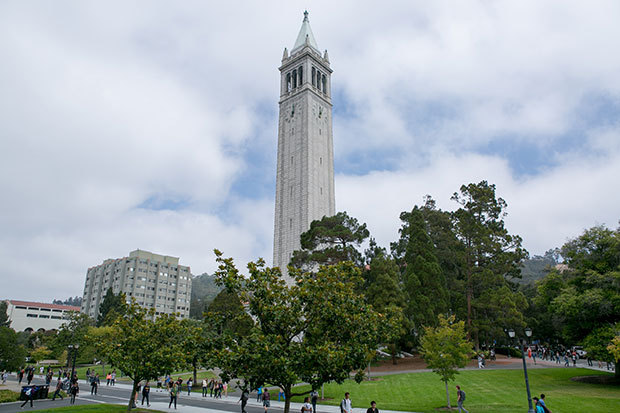Cal Refuses to Pay Berkeley Minimum Wage

The city’s largest employer — UC Berkeley — says it’s exempt from abiding by the new minimum wage of $10 an hour in Berkeley.
By Darwin BondGraham
Throughout California, local governments have been implementing municipal minimum wage ordinances that raise the pay of hundreds of thousands of low-wage workers — but these laws are already running up against jurisdictional limits, leaving thousands of workers behind. For example, the City of Berkeley’s decision to increase its minimum wage to $10 an hour this year and to $12.53 an hour by 2016 is being ignored by the city’s largest employer: the University of California.
On October 1, Berkeley’s minimum wage rose from the state-mandated level of $9 per hour to $10 per hour under the new city law. But UC Berkeley is paying several hundred student employees between $9 and $9.50 per hour, or about 5 to 10 percent below the city’s required minimum wage. These students are employed through the campus’ work-study program and work for UC Berkeley. All of the jobs appear to be for campus security monitors and academic center assistants. Security monitors work between the hours of 6 p.m. and 2 a.m., keeping the campus safe for the 8,000 Berkeley undergraduate students who reside in dorms. Academic center assistants help run the campuses study halls. A UC Berkeley website advertising these low-paying jobs recently showed that there were 93 positions currently open.
I dropped by several campus work sites last week to talk with student employees. Two undergraduates working behind a desk in a dorm told me they earn $9 an hour. Neither was aware of the City of Berkeley’s $10 minimum wage, but both said they could use the extra money due to the high cost of living in Berkeley and of attending UC.
Ellen Topp, UC Berkeley’s director of communications for student affairs, stated in an email that the university is knowingly flouting the city’s minimum wage, because she said “the UC system’s constitutional autonomy exempts it from municipal wage laws.” Topp was referring to the university’s status as an autonomous branch of state government. In other words, UC isn’t bound by certain city and county laws, and therefore follows the state-mandated minimum wage of $9 per hour.
“Regardless, UC Berkeley is committed to its employees and values the principle of a fair wage for all employees,” wrote Topp. “Wage levels are continually reviewed to serve the interests of our lowest paid workers. Given UC Berkeley’s budget constraints, an increase in the middle of the academic year may have a significant financial impact and needs to be carefully considered.”
But while the UC system has so far refused to abide by local wage laws, in recent years, the UC Board of Regents has repeatedly approved large pay hikes for the system’s top administrators. Harry Le Grande, Berkeley’s vice chancellor for student affairs, who oversees the campus work study program and its $9 an hour employees, was appointed to his position in 2008 at a base salary of $215,000 — a 34 percent raise over his previous pay. UC Berkeley Chancellor Nicholas Dirks is paid $486,800 a year in cash compensation. When Dirks was appointed chancellor in 2012, the regents boosted pay for the job by 11 percent. Dirks also gets an annual car allowance of $8,916, and was granted a “relocation allowance” of $30,425 to be paid over the next four years. Earlier this year, the regents approved a 22-percent pay increase for Berkeley’s vice chancellor and provost Claude Steele. His current salary is $450,000.
Through a California Public Records Act request, I attempted to obtain a list of UC Berkeley students currently employed by the campus and their hourly wages. But LeVale Simpson, UC Berkeley’s interim public records coordinator, wrote in an email that “there is no such list, or any similar record.” Simpson added that “even if the record you have requested was in existence, it would be exempt from disclosure. The University is prohibited from disclosing student records and other personally identifiable student information.”
City of Berkeley officials are aware that UC is paying students below their municipal minimum wage, but say it’s not the city’s role to tell UC what to do. “We don’t govern other jurisdictions,” said city spokesperson Matthai Chakko. “Those aren’t part of our powers.”
Councilmember Kriss Worthington, whose city council district encompasses the area next to the UC campus and neighborhoods with several thousand student constituents, said in an email that students have been lobbying UC Berkeley to raise its minimum wage.
However, with UC aggressively increasing tuition in order to raise revenue, it’s unclear how receptive school administrators will be toward proposals to lift wages for some of their lowest paid workers. Just last month, the UC Regents unveiled a plan to increase tuition by as much as 5 percent every year for the next five years. The total annual cost of attending UC Berkeley as an undergraduate is currently $32,000, according to the Office of Undergraduate Admissions. A student working 20 hours a week through a campus work study job paying $9 an hour can only earn about $2,000 a semester, or $4,000 a year.
[Source]: East Bay Express


